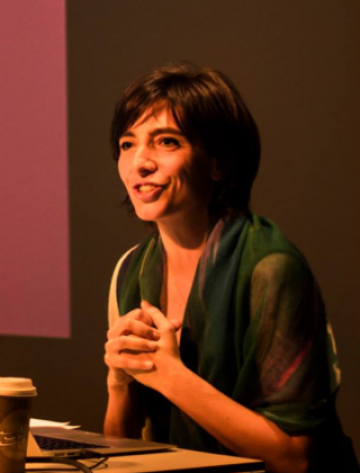Aslı Niyazioğlu
Faculty/College Address:
Faculty of Asian and Middle Eastern Studies / Exeter College
Academia.edu:
https://oxford.academia.edu/ASLINIYAZIOGLU
Research interests:
I am an early modern Ottoman historian working on talismanic antiquities, dreams, gardens, and urban history.
I returned to Oxford’s Faculty of Oriental Studies, where I had served as a departmental lecturer, in 2017, after nearly a decade at Koç University, Istanbul. Prior to that, I held a postdoctoral fellowship at the Wissenschaftskolleg zu Berlin and received my PhD in History and Middle Eastern Studies at Harvard.
Currently, I am working on two book projects on the role of imagination in the making of urban communities of the early modern Istanbul. The first explores the Ottoman interest in Istanbul’s columns, obelisks, and statues as occult objects. For many Ottoman writers, Istanbul’s antiquities were not irrelevant remains of a distant past, as often assumed, but had significant uses for the present. Drawing on the research for the ERC-funded project Geographies and Histories of the Ottoman Supernatural Tradition (https://ghost.ims.forth.gr/), my book explores what we miss when we neglect their stories as mere repetitions of folkloric tales. My second book project on Istanbul’s history is a short monograph on the gardens of poets in the sixteenth century Istanbul commissioned by The History of Constantinople Series of the Cambridge University Press. In dialogue with scholarship on poets’ gardens in different cities of the early modern world, it examines the interplay between the real and imaginary and shows the ways in which gardens and their stories opened spaces of transformation for the sixteenth-century Ottoman literati.
In my first book, Dreams and Lives in Ottoman Istanbul (Routledge, 2016) I also worked on the cultural life early modern Istanbul and explored biography writing and dream narratives of literary circles. Dreams and Lives in Ottoman Istanbul shows how the narration of dreams provided biographers with a means to form learned communities in a politically fragile landscape and gave them the space to debate the correct career paths in early seventeenth-century Istanbul. Recent studies have examined the shared political and economic rhythms between Habsburg Spain, Safavid Iran, Mughal India, Ming China and the Ottoman Empire, and there is now a strong interest in comparative approaches that examine cultural lives in the early modern world. This first English-language monograph on Ottoman dreamscapes as my other publications builds upon this comparative research and introduces a world where dreams changed lives; the dead appeared in broad daylight; and biographers invited their readers to the gardens of remembrance.
For my publications available online, please see,
https://oxford.academia.edu/ASLINIYAZIOGLU
SELECTED PUBLICATIONS:
Book
- Dreams and Lives in Ottoman Istanbul: A Seventeenth Century Biographer's Perspective, (London and New York: Routledge, 2016).
Edited Volume
- Aşık Çelebi ve Şairler Tezkiresi Üzerine Yazılar (Studies on Aşık Çelebi and his Biographical Dictionary of Poets), co-edited with Hatice Aynur, (İstanbul: Koç University Press, 2011).
Articles and Book Chapters (English)
- “How to Stroll in the Nineteenth-Century Istanbul?: Al-Sidyaq and Ahmet Rasim take their readers for a walk,” with Ilham Khuri-Makdisi in Crafting History, Essays on the Ottoman History and Beyond in Honor of Cemal Kafadar, eds. Rachel Goshgarian, Ilham Khuri-Makdisi and Ali Yaycıoğlu, Boston: Academic Studies Press, 2023, 467-85.
- “Into the Deep Past of the Ottoman Istanbul: The Bronze Horseman of Constantine in Sixteenth-Century ʿAcāʾibs” in Aca’ib: Occasional papers on the Ottoman perceptions of the supernatural 3 (2022): 13-35.
- “Poets, Sufis and their City Tours," in Early Modern Istanbul, Brill Companion Series on Early Modern Cities, eds. Shirine Hamadeh and Çiğdem Kafescioğlu, Leiden: Brill, 2022, 655-71.
- “Practices of Remembrance and Sites of Violence in Seventeenth-Century Istanbul: The Beheading of Sheikh İsmā‘il Ma’şūkī (d.1539),” in Realms of Transformation in Ottoman History, eds. Akşin Somel and Seyfi Kenan, Leiden: Brill, 2022, 97-122.
- “How to Read an Ottoman Poet's Dream? Friends, Patrons and the Execution of Fiġānī (d.938/1532)” Middle Eastern Literatures 16.1. 2013: 48-60.
- “Secrets of the Ottoman Lives?” in The Uses of First Person Writings Africa, America, Asia, Europe, François-Joseph Ruggui, ed. (Brussels: Peter Lang, 2013), 191-201.
- “Ottoman Biography Writing and the Halveti-Sünbüli Sheikhs of Sixteenth Century Istanbul” in Many Ways of Speaking About the Self, Middle Eastern Ego-Documents in Arabic, Persian and Turkish (14th-20th Century), Ralph Elger and Yavuz Erköse eds. (Wiesbaden: Harrassowitz, 2010), 171-185.
- “Dreams of the Very Special Dead: Nevizade Atai’s (d.1635) Reasons for Composing His Mesnevis” Archivum Ottomanicum 25 (2008): 221-33.
- “The Sixteenth Century Ottoman Poet in Reclusion,” in Poetry’s Voice, Society’s Norms: Forms of Interaction Between Middle Eastern Writers and Their Societies, Angelika Neuwirth, Barbara Winckler, Andreas Pflitsch eds. (Berlin: Reichert, 2006), 225-37.
Articles and Book Chapters (Turkish)
- Evliya Çelebi ve Sözlü Kaynakları, Ankara: UNESCO, (2012): 107-114. (“Fathers and Sons: Why did Evliya Çelebi use his Father as an Oral Source?” in Oral Sources of Evliya Çelebi).
- “On Altıncı Yüzyıl Sonunda Osmanlı'da Kadılık Kabusu ve Nihânî’nin Rüyası” (“Nightmares of the Judges and Nihânî in the Late Sixteenth Century Ottoman Empire”) Journal of Turkish Studies 31/II (2007): 133-143.
- “Aşık Çelebi’ye Rüyaların Söyledikleri” in Aşık Çelebi ve Şairler Tezkeresi Üzerine Yazılar, co-edited with Hatice Aynur, (İstanbul: Koç University Press, 2011):71-85. (“Dreams and Aşık Çelebi” in Studies on Aşık Çelebi and his Biographical Dictionary of Poets).
Interviews and Community Outreach
- Interview for Ottoman History podcast
http://www.ottomanhistorypodcast.com/2012/08.html
- Interview for Turkish Television TRT
- Interviews for “KUtalks”
https://www.youtube.com/watch?v=GLOb6nOwkn0
https://www.youtube.com/watch?v=10ZpGpCw1zw




